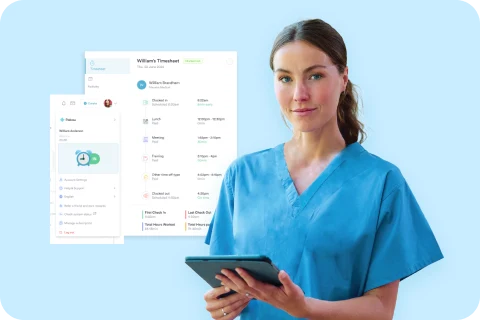Key Takeaways
Pabau: Best overall for medical-first practices that need clinical-grade patient records, compliance, automation, and built-in business growth tools. Ideal for med spas, aesthetic clinics, and multi-location healthcare practices that want everything in one platform.
Jane App: Best for allied health and therapy clinics that prioritise ease of use and basic scheduling over advanced medical workflows or revenue optimisation.
SimplePractice: Best for mental health professionals who need telehealth, documentation, and insurance billing, but don’t require complex scheduling, analytics, or aesthetic-specific workflows.
If you’re looking for practice management software, the best cloud-based solutions automate scheduling, payments, reporting, and patient communication in one system.
In this guide, we explain what cloud-based practice management software includes and compare the 7 best platforms to help you choose the right fit for your healthcare practice.
What is a cloud-based practice management system?
A cloud-based practice management system is a software application that helps healthcare practices manage everything from daily operations to client interactions.
Unlike on-premise software, a cloud-based medspa software solution is available entirely online, which makes it super handy for accessing vital information whenever, wherever. Set up the cloud once and it will automatically run complex processes, from reporting to patient scheduling.
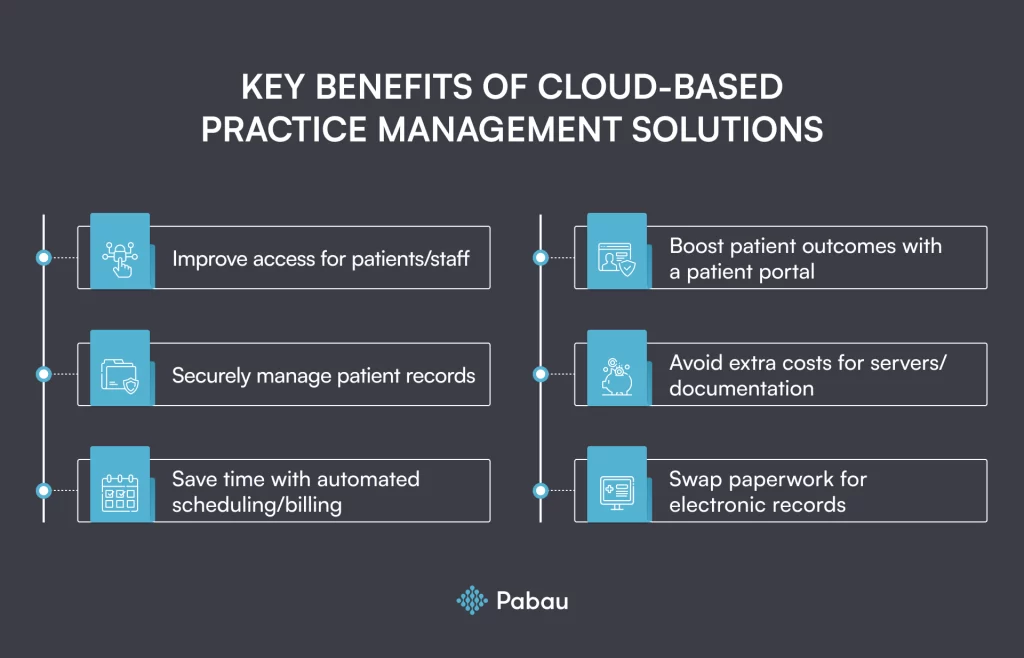
Core practice management software solutions all practices need
Scheduling & online booking
Scheduling tools manage appointments across providers, locations, and services.
Most modern systems include:
- Online booking pages for patients
- Real-time availability updates
- Automated appointment confirmations and reminders
Pro Tip
Online booking and automated reminders are proven to reduce no-shows and front-desk workload.
EHR/EMR & patient records
Patient records are the foundation of plastic surgery practice EMR software, storing both clinical and administrative data in one place.
Key capabilities include:
- Digital patient profiles
- Treatment history and SOAP notes
- Consent forms and medical documentation
For med spas and clinics, tight integration between practice management and EHR is essential to avoid duplicate data entry.
Billing, payments & claims
Billing tools handle how practices get paid.
Core functions usually include:
- Card and online payments
- Invoicing and receipts
- Insurance claims support (where applicable)
Manual billing processes increase error rates and delay cash flow, making automation a critical requirement.
Patient communication & portals
Patient communication tools reduce inbound calls and improve engagement.
Common features include:
- Automated SMS and email reminders
- Secure patient messaging
- Online forms and patient portals
These tools improve patient experience while reducing administrative workload.
Reporting & analytics
Reporting tools help practices understand performance and make better decisions.
Most platforms offer:
- Revenue and sales reports
- Appointment utilisation metrics
- Practitioner and staff performance tracking
Clear reporting is essential for identifying growth opportunities and operational bottlenecks.
Staff scheduling
Staff scheduling features manage practitioner availability and workload.
They typically support:
- Shift planning
- Multi-location staff allocation
- Permission-based access
For growing practices, staff scheduling helps prevent overbooking and burnout.
7 best practice management software
Pabau: Best all-around practice management software
Pabau is a cloud-based practice management platform built specifically for medical-first practices that need both robust clinical workflows and business growth tools.
Unlike repurposed salon software or legacy medical systems, Pabau combines patient care, compliance, automation, and revenue analytics in one unified platform.
Key features
Pabau is designed to manage the entire patient journey, from consultation to long-term retention.
- All-in-one scheduling & CRM
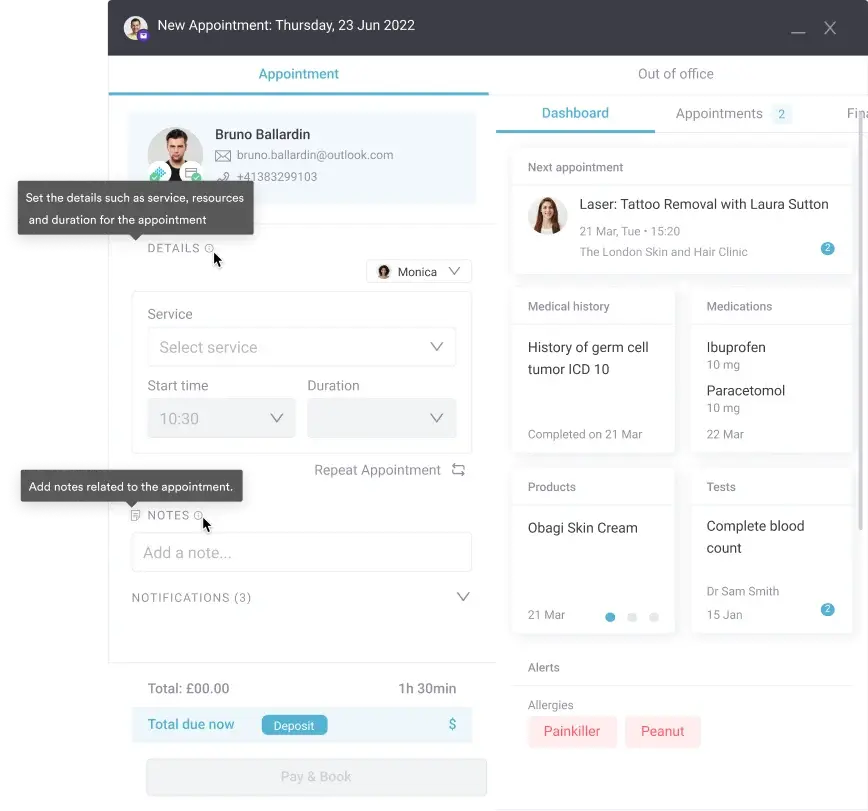
Appointments, staff calendars, and patient records live in one system. Automated reminders reduce no-shows, while the built-in CRM tracks every patient interaction.
- Medical-first clinical care tools
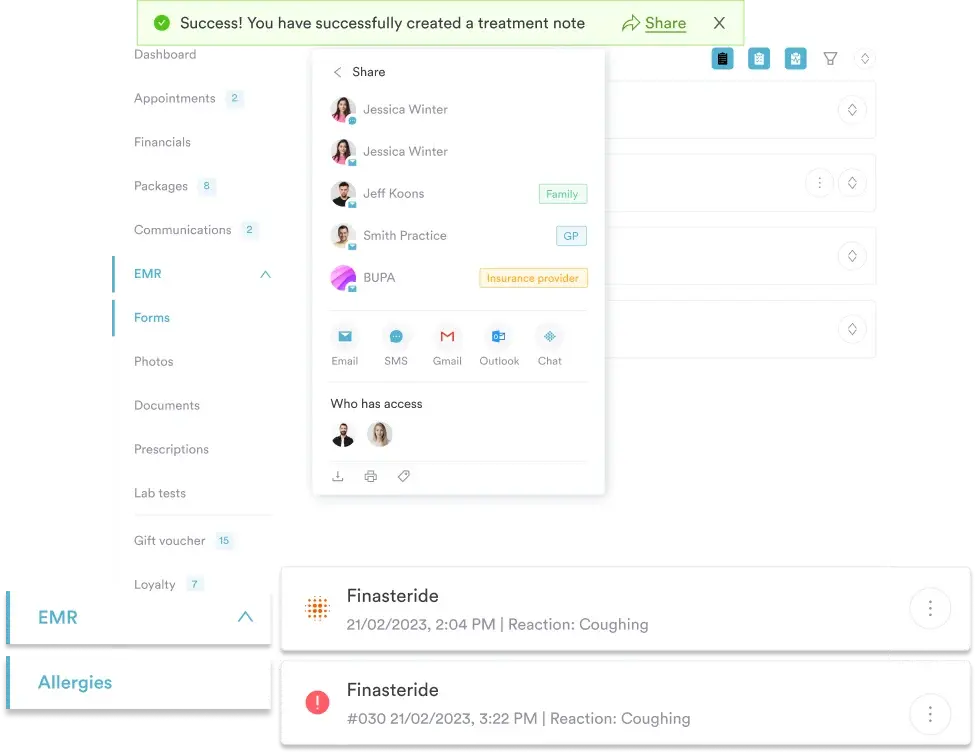
Consultations, treatment protocols, compliance tracking, secure records, and before/after photos are built specifically for regulated medical environments.
- Marketing automation & analytics
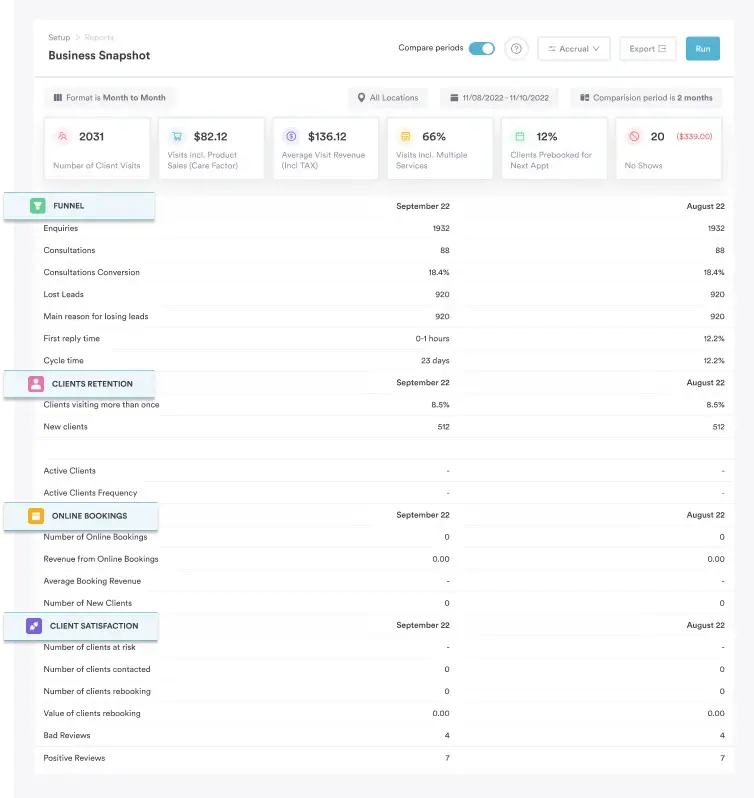
Automated campaigns, reputation management, memberships, and custom dashboards help practices grow revenue while maintaining patient engagement.
Pricing
Pabau offers tiered pricing based on clinic size and feature needs. All plans include core features such as online booking, patient records, digital forms, and marketing tools. Higher tiers unlock advanced reporting, automation, and multi-location features.
For the most accurate overview, visit the official Pricing page or book a demo to receive a tailored quote based on your clinic’s workflow.
Where Pabau shines
- Medical-first design: Built for compliance, consultations, and clinical documentation, not adapted from salon software
- Business growth built in: Marketing automation, reputation tracking, memberships, and revenue insights
- True all-in-one platform: Scheduling, EHR, payments, CRM, and analytics in a single system
Where Pabau falls short
- Premium depth: May feel advanced for very small or appointment-only practices
- Onboarding time: Setup takes longer than lightweight booking tools
Customer reviews
“10/10 Pabau is a user-friendly and efficient software that makes managing the clinic so much easier. It offers a wide range of great features for scheduling, patient management, and marketing—all in one place. It’s also reasonably priced compared to other systems, making it a great value for what it provides.”, Elsa R., Capterra
“In summary, Pabau is a powerful and future-proof system with excellent support, provided you set it up consciously and make clear agreements about functionalities and costs.”, Gertjan B., G2
Who Pabau is best for
- Med spas & aesthetic clinics: Medical workflows plus retention tools
- Primary care & multi-location clinics: Compliance, reporting, and scalability
JaneApp
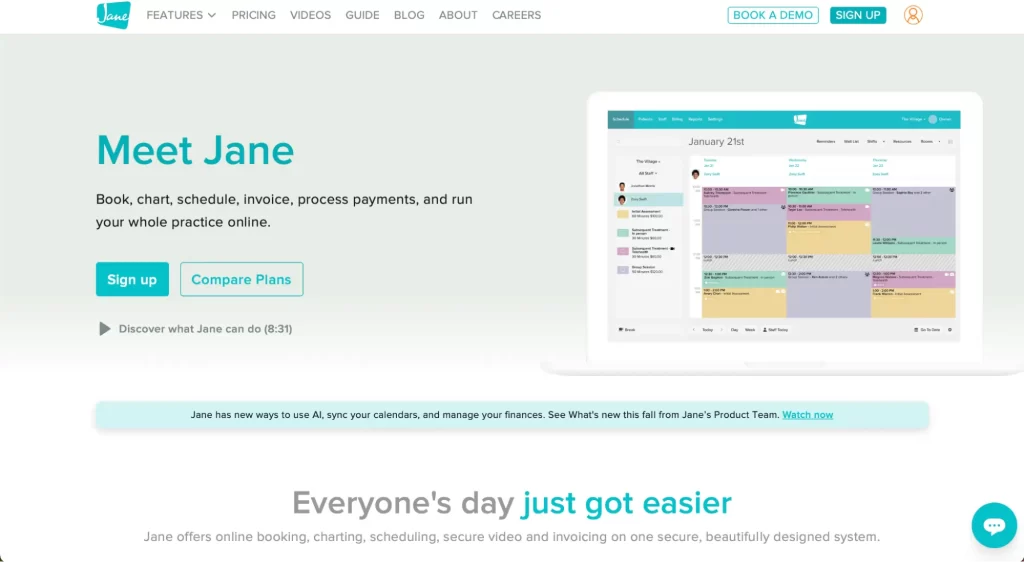
Jane is a practice management system popular with allied health and therapy clinics. It prioritises ease of use and appointment scheduling but lacks the clinical depth, compliance tooling, and growth features required by medical-first practices such as med spas and primary care clinics.
Key Features
- Appointment scheduling: Simple calendar management
- Client records: Basic notes and documentation
- Payments: Integrated payment processing
Pricing
| Plan | Price | Includes |
| Balance | $54/mo | 1 practitioner, limited to 20 appointments/mo |
| Practice | $79/mo | Unlimited appointments, staff profiles |
| Thrive | $99/mo | Advanced scheduling, retention, marketing |
Where Jane Shines
- Ease of use: Minimal training required
- Therapy-friendly: Well suited to physiotherapy and counselling
Where Jane Falls Short
- Limited medical workflows: No advanced compliance or treatment protocols
- No growth tooling: Lacks marketing automation and analytics
Customer Reviews
“Jane has been really easy to use and implement, it takes some legwork but it does everything I need it to without being over complicated.”, Maurice P., Capterra
“We have streamlined so many processes and saved money by having our EHR and CRM all in one. The integrations that Jane offers with other features like payments, faxing, and email newsletters has saved so much time and effort for us.”, Zach S., Capterra
Who Jane is best for
- Allied health clinics: Small therapy-led practices
Practice Fusion
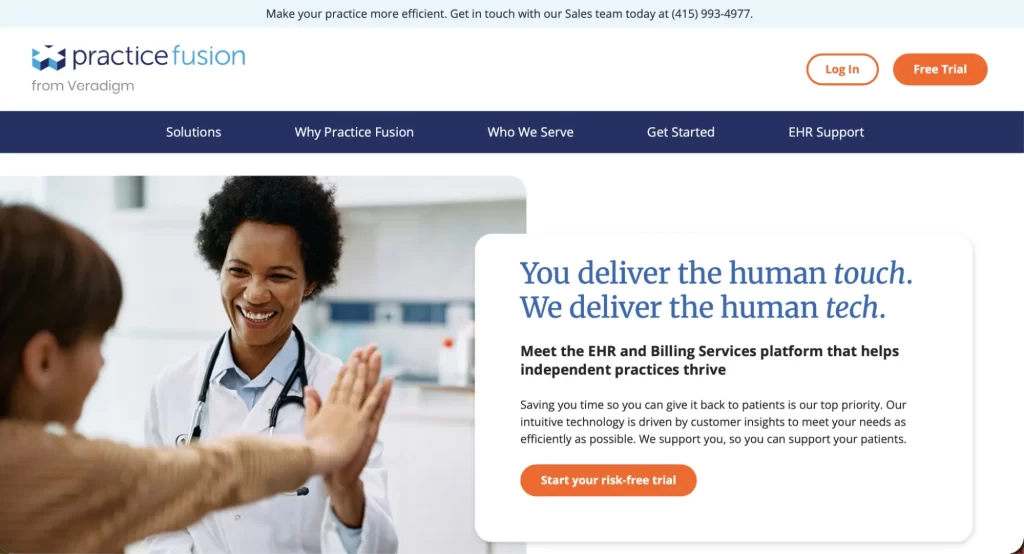
Practice Fusion is an EHR-first platform designed for small medical practices focused on clinical documentation. While strong in charting and compliance, it offers limited automation, reporting, and business growth functionality compared to all-in-one platforms.
Key Features
- EHR & charting: Clinical documentation templates
- ePrescribing: Medication management
- Basic scheduling: Appointment calendars
Pricing
| Plan | Price | Includes |
| Basic | $199/m./per provider with a required annual commitment; | includes 3 signing staff licenses & unlimited non-signing staff licenses |
Where Practice Fusion Shines
- Clinical focus: Reliable EHR functionality
- Regulatory support: Suitable for compliance-heavy environments
Where Practice Fusion Falls Short
- Limited automation: Minimal CRM and marketing tools
- Fragmented pricing: Features require add-ons
Customer Reviews
“The ease of using this software and I get to create my own templates which I love. I have been using this software for over two years and it keeps getting better. Plus it’s complimentary with CMS.”, Michael G. Capterra
“One of the things that I prefer from Practice Fusion is to have everything organized and very clear in everything. Is very easy to use and to understand.”, Gustavo P., G2
Who Practice Fusion Is Best For
- Small medical practices: EHR-first needs
SimplePractice
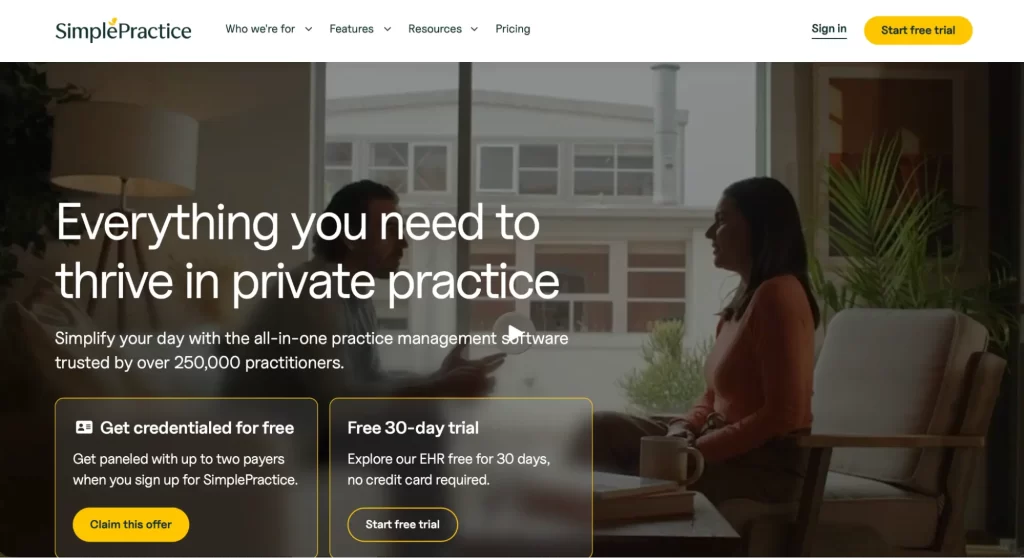
SimplePractice is a practice management platform primarily built for mental health and wellness professionals. It offers strong telehealth and documentation tools but lacks the advanced scheduling, analytics, and revenue optimization features needed by med spas and multi-location clinics.
Key Features
- Telehealth: Video consultations
- Client documentation: Notes and forms
- Billing: Insurance and invoicing tools
Pricing
| Plan | Price (per month) | Key Features |
| Starter | $49 | Core patient-management tools: automated invoicing, client portal, e-signatures, online payments, progress notes and more. |
| Essential | $79 | Includes Starter+ features, plus appointment reminders, online appointment requests, custom notes/templates, and more. |
| Plus | $99 | Full feature set: all Essential features plus group appointments & telehealth, client messaging, and premium support. |
Where SimplePractice Shines
- Mental health workflows: Therapy-first design
- Telehealth: Built-in virtual sessions
Where SimplePractice Falls Short
- Limited business analytics: Minimal growth insights
- Not built for aesthetics: No treatment protocols or image tracking
Customer Reviews
“SimplePractice is easy to use and keeps everything in one place—scheduling, notes, billing, and telehealth. It saves me a ton of time. Implementation was fast and easy. SimplePractice makes scheduling, documentation, and billing seamless in one platform.”, Ashley A., G2
“I appreciated how efficient and user-friendly SimplePractice was, making documentation and updates easy.” Sharee M., Capterra
Who SimplePractice Is Best For
- Mental health practices: Therapists and counsellors
Fresha
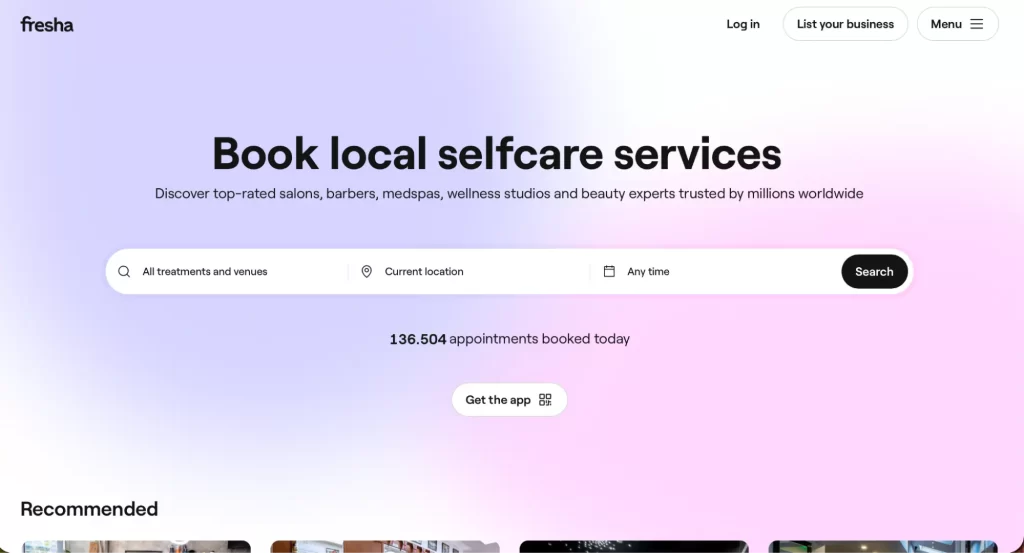
Fresha is a booking and business platform built for salons and wellness businesses. While it offers strong scheduling and marketplace exposure, it lacks medical-grade patient records, compliance tracking, and clinical workflows required by med spas and healthcare clinics.
Key Features
- Online booking: Marketplace and direct bookings
- POS & payments: Transaction-based pricing
- Client profiles: Basic CRM
Pricing
| Plan | Price (per month) | Key Features |
| Independent | ~$19.95 / month | Single calendar column, 100 free messages, 50 free marketing emails, email & chat support, online bookings free |
| Team | ~$14.95 / month per bookable team member | Multiple calendar columns, 100 free messages per team member, 50 free marketing emails per team member, phone/chat/email support |
| Enterprise | Custom pricing (contact sales) | Full feature set: all Essential features plus group appointments & telehealth, client messaging, and premium support. |
Where Fresha Shines
- Low upfront cost: No subscription fees
- Client discovery: Marketplace exposure
Where Fresha Falls Short
- No medical compliance: Not suitable for regulated care
- Scaling costs: Fees increase with volume
Customer Reviews
“I love how straightforward it is to use for booking appointments and keeping my time organized for myself and clients. I use Fresha everyday to keep tabs on upcoming appointments and to block off work days for personal time.”, Jackie B., G2
“This booking agent is very easy to use & is very versatile, and the ability to manage things on my phone is a huge bonus.”, Emily C., Capterra
Who Fresha Is Best For
- Salons & wellness studios: Non-medical services
SimplyBook.me
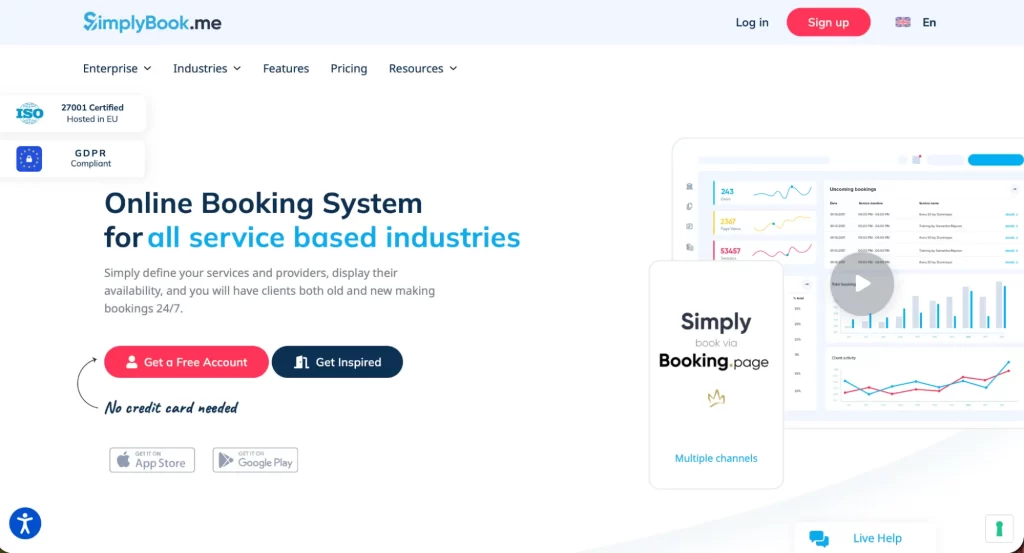
SimplyBook.me is a scheduling-focused platform offering flexible booking widgets and add-ons. It works well for basic appointment management but lacks integrated clinical care, compliance, and business growth tools.
Key Features
- Booking widgets: Website and social integrations
- Notifications: Email and SMS reminders
Pricing
| Plan | Price (Approx) | Included Bookings / Users | Key Features |
| Free | £0 / month | 50 bookings / 1 provider | Booking website, widget, admin app, basic custom features |
| Basic | £10.9 / month (annual) ~ £12.9 (monthly) | 100 bookings / 5 providers | Includes client app, payments & deposits, POS, coupons & gift cards |
| Standard | £20.8 / month (annual) ~ £25 (monthly) | 500 bookings / 15 providers | Adds branded client app, HIPAA support, more custom features |
| Premium | £45.8 / month (annual) ~ £55 (monthly) | 2,000 bookings / 30 providers | Unlimited custom features, Payments PRO, link removal & integrations |
| Enterprise | Custom | Custom | Multi-location, account manager, white label & high-load API |
Where SimplyBook.me Shines
- Booking flexibility: Multiple front-end options
- Low barrier to entry: Free plan available
Where SimplyBook.me Falls Short
No true PMS: Lacks EHR and analytics
Fragmented system: Relies heavily on add-ons
Customer Reviews
“I like that SimplyBook.me divides availability by region and shows time slots available in real time, which helps avoid human error and automates scheduling. Integrating it with Google Calendar is a breeze, and I found the initial setup to be very easy.”, Abigail T., G2
“Clear and intuitive interface. Easy to set up without external help. Helpful AI search tool and responsive live support. Flexible enough even for one-time events. Excellent value for money.”, Eliška Š., Capterra
Who SimplyBook.me Is Best For
- Very small practices: Appointment-only needs
Booksy
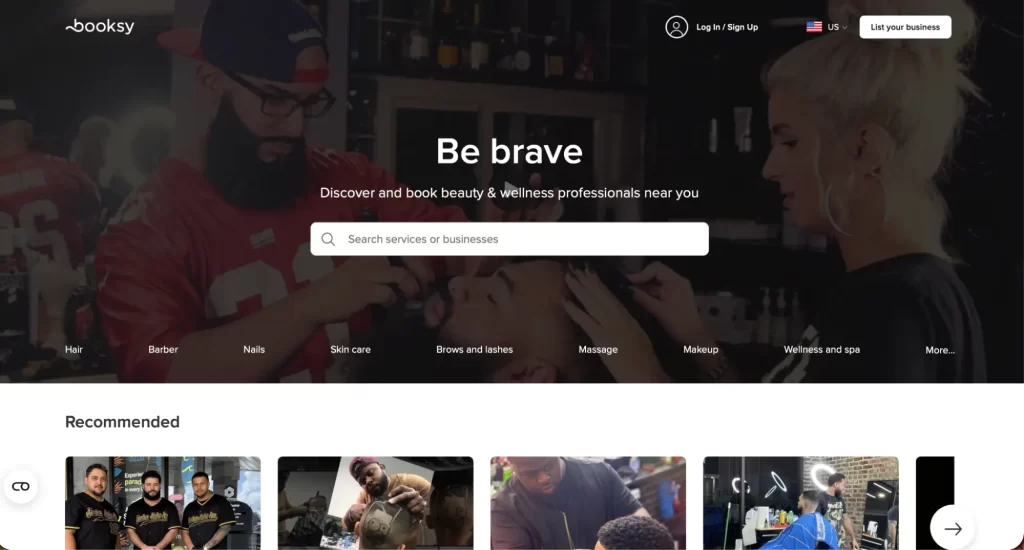
Booksy is a booking and marketplace platform aimed at independent beauty professionals. While effective for individual providers, it lacks the clinical depth, reporting, and compliance controls required by medical-first practices.
Key Features
- Marketplace bookings: Client discovery
- Calendar management: Simple scheduling
- Payments: In-app payments
Pricing
| Plan | Price | Key Details |
| Core Subscription | ~$29.99 / month + tax | All features included (scheduling, calendar, marketing tools, client management, reporting) with no tiered feature restrictions |
| Additional Users | ~$20 / month per user | Add extra team members beyond the base single user |
Where Booksy Shines
- Visibility: Built-in marketplace exposure
- Solo-friendly: Designed for individuals
Compare all the best alternatives side-by-side. View Booksy competitors
Where Booksy Falls Short
- No clinical tools: Not suitable for medical care
- Limited reporting: Minimal analytics
Customer Reviews
“It helps me with scheduling appointment management for my clients. It also helps me send out reminders or notifications when I’m having a happy hour or have something special for the holiday holidays.”, Shanice S., Capterra
“I like the easy navigation for providers. It’s very simple to add necessary information and pricing. The varies options for styles help with versatile stylists that offer many different services.”, Jeckairea S., Capterra
Who Booksy Is Best For
- Independent beauty professionals: Solo operators
How to choose the best practice management software solution
The best practice management software should support clinical care, daily operations, and business growth without forcing you to rely on multiple tools.
When comparing platforms, focus on features that directly impact efficiency, compliance, and scalability, especially if you run a med spa, aesthetics clinic, or healthcare practice.
Medical-First Clinical Workflows
Practices that deliver regulated care need more than basic notes. Look for built-in consultations, treatment protocols, compliance tracking, secure records, and before/after photo management—all in one system.
Pabau is built specifically for medical-first practices, combining clinical documentation with operational workflows in a single platform.
All-in-One Scheduling, CRM & Automation
Strong practice management software should centralise scheduling, patient records, and communication while automating reminders, forms, and follow-ups to reduce admin work and no-shows.
Pabau unifies scheduling, CRM, and automation, allowing teams to manage the entire patient journey without switching systems.
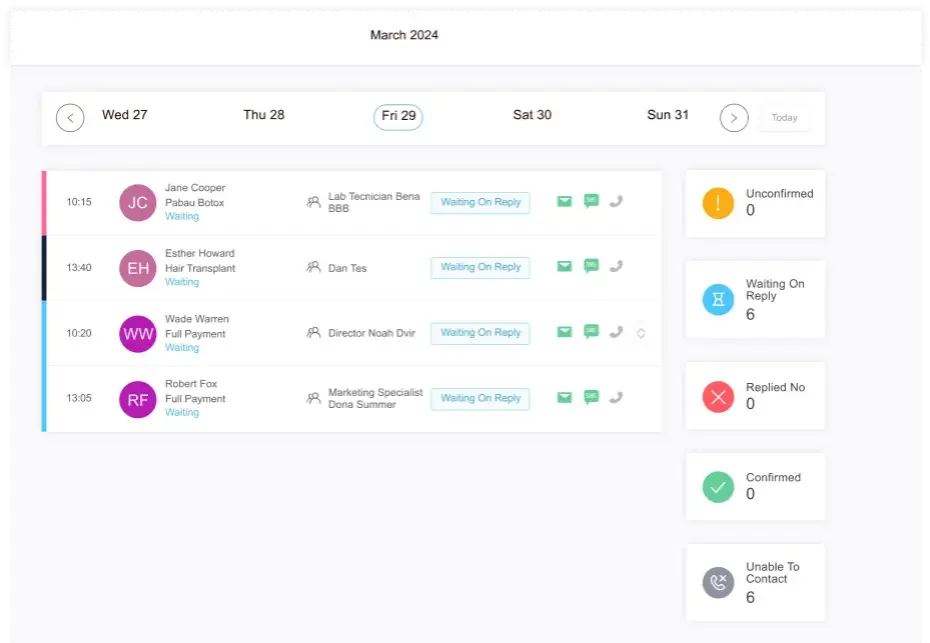
Business Growth, Reporting & Retention Tools
Beyond operations, practices need visibility into revenue, staff performance, retention, and appointment trends. Built-in analytics and loyalty features help optimize growth without manual reporting.
Pabau includes custom dashboards, memberships, packages, and marketing automation—giving practices actionable insights and predictable revenue.
Manage your entire practice inside one platform with Pabau
If you’re running a med spa, aesthetics clinic, or healthcare practice, Pabau brings together clinical care, operations, and business growth in one cloud-based platform. Instead of juggling multiple tools, teams gain efficiency, cleaner data, and measurable ROI from a single system.
Book a demo and explore the full platform at pabau.com


